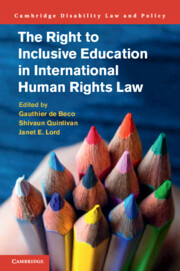Book contents
- The Right to Inclusive Education in International Human Rights Law
- Cambridge Disability Law and Policy Series
- The Right to Inclusive Education in International Human Rights Law
- Copyright page
- Contents
- Notes on Contributors
- Acknowledgements
- Preface by Theresia Degener
- The Arthur Cox Foundation
- 1 Introduction
- Part I Background
- Part II Theoretical Foundations
- Part III Implementation
- A Strategies
- 10 Strategic Litigation and Inclusive Education
- 11 Advocacy for Inclusive Education
- 12 Advancing the Right to Inclusive Education in Development Cooperation
- 13 Harnessing Technology to Realize the Right to Inclusive Education
- 14 Indigenous Knowledge–Driven Education Reform as a Means of Achieving Inclusive Education in Indigenous Communities in Canada
- B Mechanisms
- Part IV Practice
- Index
10 - Strategic Litigation and Inclusive Education
from A - Strategies
Published online by Cambridge University Press: 15 April 2019
- The Right to Inclusive Education in International Human Rights Law
- Cambridge Disability Law and Policy Series
- The Right to Inclusive Education in International Human Rights Law
- Copyright page
- Contents
- Notes on Contributors
- Acknowledgements
- Preface by Theresia Degener
- The Arthur Cox Foundation
- 1 Introduction
- Part I Background
- Part II Theoretical Foundations
- Part III Implementation
- A Strategies
- 10 Strategic Litigation and Inclusive Education
- 11 Advocacy for Inclusive Education
- 12 Advancing the Right to Inclusive Education in Development Cooperation
- 13 Harnessing Technology to Realize the Right to Inclusive Education
- 14 Indigenous Knowledge–Driven Education Reform as a Means of Achieving Inclusive Education in Indigenous Communities in Canada
- B Mechanisms
- Part IV Practice
- Index
Summary
- Type
- Chapter
- Information
- Publisher: Cambridge University PressPrint publication year: 2019



